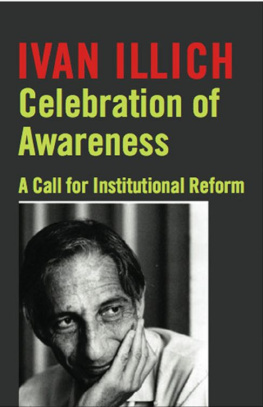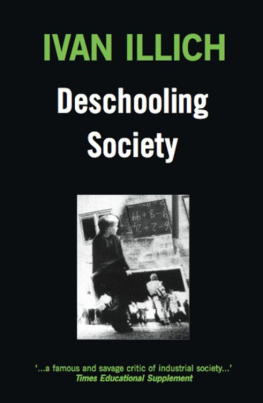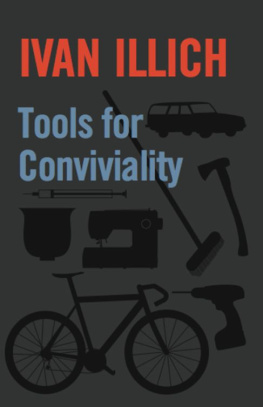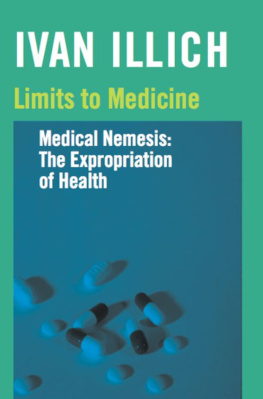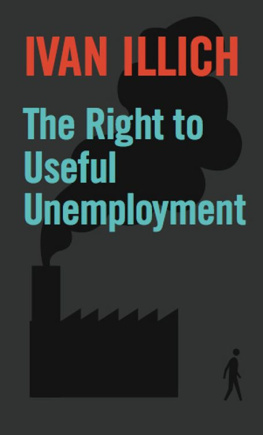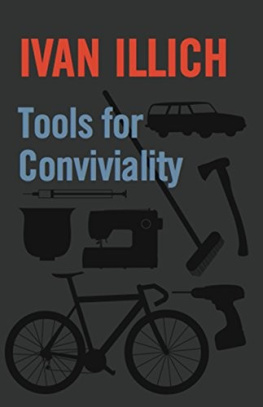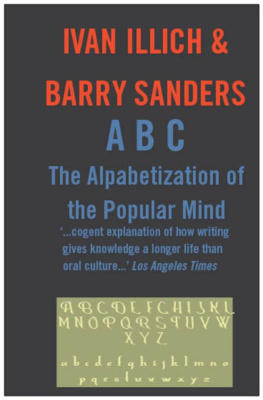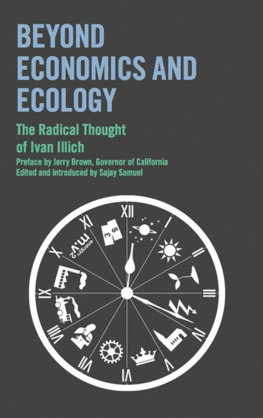There is no need for an introduction of the following papers or of their author. If, nevertheless, Dr. Illich has honored me by the invitation to write such an introduction, and if I gladly accepted , the reason in both our minds seems to be that this introduction offers an occasion that permits clarifying the nature of a common attitude and faith, in spite of the fact that some of our views differ considerably. Even the authors own views today are not always the same as those he held at the time he wrote these papers, on different occasions, over the course of the years. But he has remained true to himself in the very core of his approach and it is this core that we share.
It is not easy to find the proper word to describe this core. How can a fundamental approach to life be caught in a concept without distorting and twisting it? Yet since we need to communicate with words, the most adequateor rather, the least inadequateterm seems to be humanist radicalism.
What is meant by radicalism? What does humanist radicalism imply?
By radicalism I do not refer primarily to a certain set of ideas, but rather to an attitude, to an approach, as it were. To begin with this approach can be characterized by the motto: deomnibusdubitandum; everything must be doubted, particularly the ideological concepts which are virtually shared by everybody and have consequently assumed the role of indubitable common-sensical axioms.
To doubt in this sense does not imply a psychological state of inability to arrive at decisions or convictions, as is the case in obsessional doubt, but the readiness and capacity for critical questioning of all assumptions and institutions which have become idols under the name of common sense, logic, and what is supposed to be natural. This radical questioning is possible only if one does not take the concepts of ones own society or even of an entire historical periodlike Western culture since the Renaissancefor granted, and furthermore if one enlarges the scope of ones awareness and penetrates into the unconscious aspects of ones thinking. Radical doubt is an act of uncovering and discovering; it is the dawning of the awareness that the Emperor is naked, and that his splendid garments are nothing but the product of ones phantasy.
Radical doubt means to question; it does not necessarily mean to negate. It is easy to negate by simply positing the opposite of what exists; radical doubt is dialectical inasmuch as it comprehends the process of the unfolding of oppositions and aims at a new synthesis which negates and affirms.
Radical doubt is a process; a process of liberation from idolatrous thinking; a widening of awareness, of imaginative, creative vision of our possibilities and options. The radical approach does not occur in a vacuum. It does not start from nothing, but it starts from the roots, and the root, as Marx once said, is man. But to say the root is man is not meant in a positivistic, descriptive sense. When we speak of man we speak of him not as a thing but as a process; we speak of his potential for developing all his powers; those for greater intensity of being, greater harmony , greater love, greater awareness. We also speak of man with a potential to be corrupted, of his power to act being transformed into the passion for power over others, of his love of life degenerating into the passion to destroy life.
Humanistic radicalism is radical questioning guided by insight into the dynamics of mans nature; and by concern for mans growth and full unfolding. In contrast to contemporary positivistic thinking it is not objective, if objectivity means theorizing without a passionately held aim which impels and nourishes the process of thinking. But it is exceedingly objective if it means that every step in the process of thinking is based on critically sifted evidence, and furthermore if it takes a critical attitude toward common-sensical premises. All this means that humanist radicalism questions every idea and every institution from the standpoint of whether it helps or hinders mans capacity for greater aliveness and joy. This is not the place to give lengthy examples for the kind of common-sensical premises that are questioned by humanist radicalism. It is not necessary to do so either, since Dr. Illichs papers deal precisely with such examples as the usefulness of compulsive schooling, or of the present function of priests. Many more could be added, some of which are implied in the authors papers. I want to mention only a few like the modern concept of progress, which means the principle of ever-increasing production, consumption, timesaving , maximal efficiency and profit, and calculability of all economic activities without regard to their effect on the quality of living and the unfolding of man; or the dogma that increasing consumption makes man happy, that the management of large-scale enterprises must necessarily be bureaucratic and alienated; that the aim of life is having (and using), not being; that reason resides in the intellect and is split from the affective life; that the newer is always better than the older; that radicalism is the negation of tradition; that the opposite of law and order is lack of structure. In short, that the ideas and categories that have arisen during the development of modern science and industrialism are superior to those of all former cultures and indispensable for the progress of the human race.
Humanistic radicalism questions all these premises and is not afraid of arriving at ideas and solutions that may sound absurd. I see the great value in the writings of Dr. Illich precisely in the fact that they represent humanistic radicalism in its fullest and most imaginative aspect. The author is a man of rare courage , great aliveness, extraordinary erudition and brilliance, and fertile imaginativeness, whose whole thinking is based on his concern for mans unfoldingphysically, spiritually, and intellectually . The importance of his thoughts in this as well as his other writings lies in the fact that they have a liberating effect on the mind by showing entirely new possibilities; they make the reader more alive because they open the door that leads out of the prison of routinized, sterile, preconceived notions. By the creative shock they communicateexcept to those who react only with anger at so much nonsensethey help to stimulate energy and hope for a new beginning.
ErichFromm
Each chapter in this volume records an effort of mine to question the nature of some certainty. Each therefore deals with deceptionthe deception embodied in one of our institutions. Institutions create certainties, and taken seriously, certainties deaden the heart and shackle the imagination. It is always my hope that my statements, angry or passionate, artful or innocent, will also provoke a smile, and thus a new freedomeven though the freedom come at a cost.
Shortly after original publication most of these papers became notorious. This was not accident. Each essay was written in a different language, addressed to a different group of believers, meant to hit home at a particular crisis of confidence. Each rubbed some well-established bureaucrats the wrong way, at the moment the latter were finding it difficult to rationalize a business as usual position.
These pieces were, therefore, literally written for the moment. The passage of time since some of them appeared has qualified an occasional detail: statistics, or the situation discussedeven my own attitudemay have altered since, in some manner or degree. But I have purposely not, in the journalistic phrase, updated the articles for presentation in this book form. They constitute a point of view on a phenomenon of a time, and should stand thus. Their compilation has also inevitably resulted in some repetitive statements of fact and some duplications of expressions. These too I leave as stated, for emphasis and for the recordthough I would have avoided them had I thought originally that one day I would gather my occasional writings under one cover.

